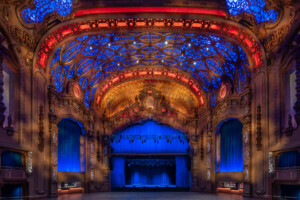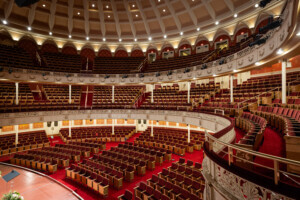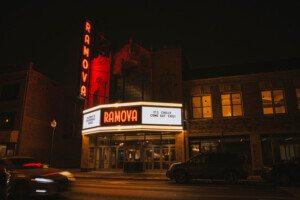The restoration of Memphis’s iconic Universal Life Insurance Company Building, long a nucleus of Black commerce and activism in Tennessee’s second-largest city, has been recognized with a Richard H. Driehaus Foundation National Preservation Award by the National Trust for Historic Preservation.
The Universal Life Insurance Company Building joins two other recipients of the 2020 Driehaus Foundation National Preservation Awards: In Boston, the Fowler Clark Epstein Farm, a rare surviving Federal period farmstead, had fallen into a state of disrepair and risked being demolished before it was saved and painstakingly reimagined as an innovative, community-benefitting urban farming hub by Historic Boston, the Trust for Public Land, and others. And in Manhattan, the Chelsea District Health Center, an aging New Deal-era Manhattan clinic focused on sexual health, was transformed into a state-of-the-art medical facility by the NYC Department of Health and Mental Hygiene and Stephen Yablon Architecture.
Described as the “nation’s most coveted and prestigious awards bestowed on historic preservation efforts that demonstrate excellence in preservation practice and partnerships, as well as a transformative impact on the vitality of their communities,” the five-year-old Driehaus Foundation National Preservation Awards are bestowed annually by the National Trust. This year’s external awards jury was comprised of Justin Garrett Moore, an urban designer, educator, and executive director of the New York City Public Design Commission; Anthea M. Hartig, the Elizabeth MacMillan Director of the National Museum of American History, and Carl Elefante, the national president of the American Institute of Architects and principal emeritus at Washington, D.C.-headquartered firm Quinn Evans.
While all three recipients of the award are no doubt worthy of praise, the recognition of the Universal Life Insurance Company Building and its restoration comes during a heightened effort to preserve and promote heritage sites associated with African American stories as well as enhanced scrutiny regarding racial diversity—and the lack thereof—in the architectural profession.
Completed in 1949 at a prominent intersection on the edge of downtown Memphis along Dr. Martin Luther King Jr. Avenue (formerly Linden Avenue), the Egyptian Revival-style building—flanked by a locally iconic freestanding neon clock and sign—is unique in that it was not only designed by a pioneering Black-owned architectural firm, McKissack & McKissack, for a Black client, the Universal Life Insurance Company (ULICO), it was also brought back to life by a Black-owned firm (and current owner and tenant), Self+Tucker Architects.
Established in 1905 in Nashville by brothers Moses McKissack III and Calvin McKissack as the first Black-owned architecture practice in the United States, McKissack & McKissack is also the nation’s African American-owned oldest architecture and engineering firm. Today, the McKissack architectural legacy lives on through two separate firms owned and operated by the granddaughters of Moses McKissack III: Cheryl McKissack Daniel serves as president and CEO of McKissack & McKissack, the original Nashville firm now headquartered in New York City, while her twin sister Deryl McKissack is president and CEO of McKissack & McKissack, an offshoot of the same name established in 1990 and headquartered in Washington, D.C.
As for ULICO, it was founded by Dr. J. E. Walker, A. W. Willis, and M. W. Bonner in 1923 on neighboring Beale Street to improve “the economic condition of people of color.” By the early 1970s, ULICO grown to be the largest Black-owned business in Memphis as well as the fourth largest Black-owned insurance firm in the country according to the National Trust.
While its primary function was as headquarters for a renowned company, the landmark “Universal Life” building wasn’t just dedicated to the bustling business of risk management. The terrazzo-floored three-story building’s basement cafeteria was a popular meeting place for organizers—Jesse Jackson and Sammy Davis Jr. among them—during the Civil Rights movement and at one point was home to the Memphis chapter of the NAACP according to the National Trust. During a period of American history when professional opportunities hinged on the color of one’s skin, the Universal Life Insurance Company Building, built by a successful Black architecture firm for a successful Black insurance company, was emblematic of African American ingenuity and prosperity—a conspicuous, limestone-clad symbol of aspiration.
Reads a resource report prepared by the MTSU Center for Historic Preservation:
Equipped with modern office equipment and a recreation room for employees, the ULICO building was not only visually stunning, it was the embodiment of African American entrepreneurship, political savvy, and years of resistance to white oppression. The partnership between ULICO and McKissack and McKissack that produced the building represented the coming together of two of the most powerful African American-owned businesses in the South as well as the dynamic of reciprocity in the black business community.
As detailed by the National Trust, ULICO folded in 2002, and, by that time, its aging headquarters had fallen into a state of disrepair. The vacant building’s fate remained uncertain until 2006 when it was purchased by architects Juan Self and Jimmie Tucker from ULICO’s sister company, the Tri-State Bank, with the goal of restoring the building while also basing their growing practice—established in 1995—there. The following year, the building was listed on the National Register of Historic Places.
However, as explained by the National Trust in its profile of the project, financing the $6.2 million renovation project was a drawn-out process that didn’t achieve full lift-off until several years after Self and Tucker purchased the building when funding was secured as part of a public-private partnership established with the City of Memphis. As part of the partnership, the city now populates just under half of the footprint of the carefully restored 33,000-square-foot space, which officially reopened in April 2018 to acclaim. In 2019, as part of its ten-year lease agreement with Self and Tucker, the city opened the Fred L. Davis Innovation Center, an entrepreneurial resource hub for small businesses operated by the city’s Office of Business Diversity Compliance, on the first floor of the Universal Insurance Company Building. Today, the LEED-certified landmark features a green roof, solar array, and upgraded high-efficiency mechanical systems while retaining much of its ornate historical detail.
“Our focus from the start was to become a hub of entrepreneurs, and in some respects the city office there helps to propagate that,” Self told the National Trust’s Preservation magazine. “It’s attracting entrepreneurs and creatives and creating a different vibe that is focused on economic development and business development so our community can grow and prosper.”
A 2019 article from Storyboard Memphis provides a deeper dive into the history of the Universal Life Insurance Company Building and the award-winning effort to revive it.











